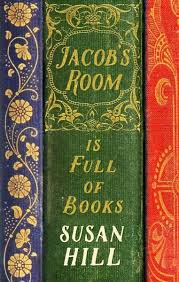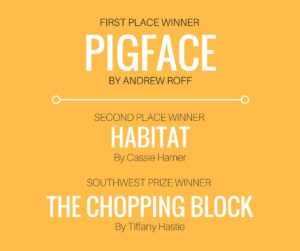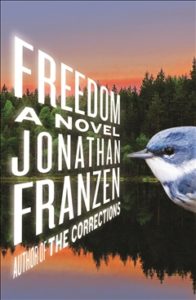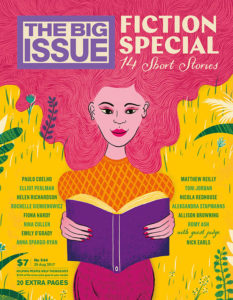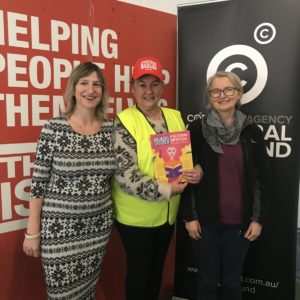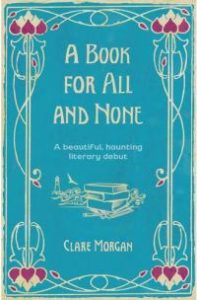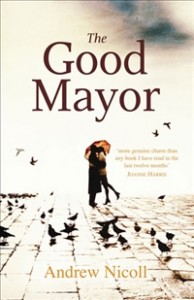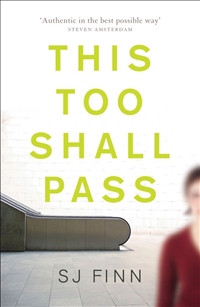Of the 53 books I read in 2018, 14 were by male authors and 39 by women (27% to 73%) The year before it was was even fewer by men (22%). A fifth of the books I read were non-fiction and the rest fiction. The year before I lamented the amount of ‘shlock’ I read (the guilty pleasures) with only eleven books being classified as ‘literary’. Unfortunately last year I fared no better – I managed just twelve literary fiction works. In my defense I did read a lot 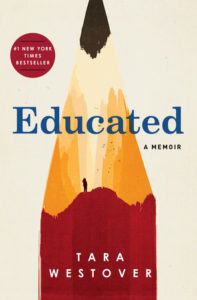 of ‘serious’ non-fiction. A new thing is the number of audiobooks listened to. These are turning out to be supplementary to my reading of physical and ebooks so I’m fitting more books into my life which suits me. Here are my highs and lows for 2018.
of ‘serious’ non-fiction. A new thing is the number of audiobooks listened to. These are turning out to be supplementary to my reading of physical and ebooks so I’m fitting more books into my life which suits me. Here are my highs and lows for 2018.
Best book of the year: Educated. ‘Wild Swans’ blew my mind in 2017 and ‘Educated’ by Tara Westover blew my mind last year. It is a searingly honest account of growing up in a survivalist family, revealing her complicity in it. Education is her eventual way out but she, and we, are educated in another way by reliving the violence, trauma, beauty and belonging of the narrative. As with the most successful of these real-life stories – ‘Wild’ by Cheryl Strayed is another example – ‘Educated’ is cleverly and beautifully structured. It deserves the acclaim that has been heaped on it.
Book that opened my eyes: Marie Antoinette by Antonia Fraser. One of the things about borrowing audiobooks through the local library is having to trawl through the limited range 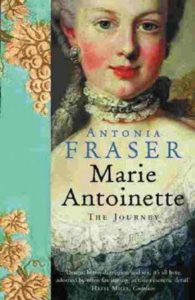 to find something I might like. For some reason I thought I might try ‘Marie Antoinette’ by Antonia Fraser. I don’t know why as I had no particular interest in this period of history. Historians who take on well-trodden material have to have a new angle and Fraser’s is to write sympathetically about a woman who has been traduced in the popular imagination. As with most things, the story is more complex and less black and white, and as with much of history, women are viewed through the misogyny of male record keepers. Fraser presents a woman who is of her class but who tries to do her best in the circumstances meted out to her (Marie Antoinette was an outsider, a German, so held in suspicion by the court). She is circumscribed by dress codes and the minutiae of court traditions. She appears to have cared for the king and been a loving mother to her children at a time when they were often left to be brought up by nannies and tutors. When the revolution began she was vilified brutally in pamphlets, even accused of incest with her eight-year-old son. It did remind me of the ‘lock her up’ hatred thrown at Hillary Clinton.
to find something I might like. For some reason I thought I might try ‘Marie Antoinette’ by Antonia Fraser. I don’t know why as I had no particular interest in this period of history. Historians who take on well-trodden material have to have a new angle and Fraser’s is to write sympathetically about a woman who has been traduced in the popular imagination. As with most things, the story is more complex and less black and white, and as with much of history, women are viewed through the misogyny of male record keepers. Fraser presents a woman who is of her class but who tries to do her best in the circumstances meted out to her (Marie Antoinette was an outsider, a German, so held in suspicion by the court). She is circumscribed by dress codes and the minutiae of court traditions. She appears to have cared for the king and been a loving mother to her children at a time when they were often left to be brought up by nannies and tutors. When the revolution began she was vilified brutally in pamphlets, even accused of incest with her eight-year-old son. It did remind me of the ‘lock her up’ hatred thrown at Hillary Clinton.
Most absorbing page turner – The Living and the Dead in Winsford: Isn’t this the sort of book we yearn for? Something that draws us in as gives us a deep satisfaction? There were a couple of contenders for this. ‘Lorna Doone’ 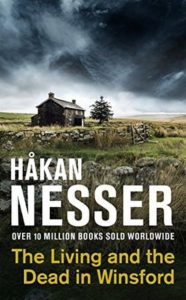 was a rollicking read and I really enjoyed ‘Snap’ by Belinda Bauer, but two psychological thrillers really gripped me: ‘Fear’ by German writer Dirk Kurbjuweit and ‘The Living and Dead in Winsford’ by Swedish writer Hakan Nesser. I chose the latter as it is one of those stripped down, taught novels that use a small canvas to build up tension and apprehension. The narrator is a woman living under the radar in a rented cottage in remote Exmoor with her dog (coincidentally she reads Loorna Doone also set in Exmoor to while away the time). The reader slowly finds out why she is on the run and what she has done but by that time we are totally on her side hoping she can remain undiscovered. It has one of the great first lines: ‘The day before yesterday I decided that I would outlive my dog. I owe him that.’
was a rollicking read and I really enjoyed ‘Snap’ by Belinda Bauer, but two psychological thrillers really gripped me: ‘Fear’ by German writer Dirk Kurbjuweit and ‘The Living and Dead in Winsford’ by Swedish writer Hakan Nesser. I chose the latter as it is one of those stripped down, taught novels that use a small canvas to build up tension and apprehension. The narrator is a woman living under the radar in a rented cottage in remote Exmoor with her dog (coincidentally she reads Loorna Doone also set in Exmoor to while away the time). The reader slowly finds out why she is on the run and what she has done but by that time we are totally on her side hoping she can remain undiscovered. It has one of the great first lines: ‘The day before yesterday I decided that I would outlive my dog. I owe him that.’
New author discovery – Amie Kaufman: I had heard of Amie Kaufman and the phenomenon of the Illuminae files but had never read any of her books. In 2018 I read her children’s book ‘Ice Wolves’ an enjoyable fantasy where selected children have special powers. Our hero, Anders, finds out he is an ice wolf, a regimented life he is not look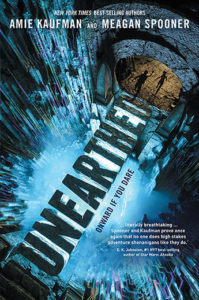 ing forward to. His eyes are opened to the problems of his society when he finds out his twin sister is a scorch dragon, a sworn enemy, thus making her an outcast. I was interested enough to seek out more Kaufman such as her YA fantasy, ‘Unearthed’ (with Meagan Spooner). An immensely fun adventure set on a seemingly dead planet where archaeologist, Jules, is marooned with artefact scavenger, Mia. Mistrust and misunderstandings abound but they have to work together to solve the clues left by the Undying in their labyrinthine temple. I usually eschew double author narratives but as the story alternates between two voices (Jules and Mia) it works well in this instance.
ing forward to. His eyes are opened to the problems of his society when he finds out his twin sister is a scorch dragon, a sworn enemy, thus making her an outcast. I was interested enough to seek out more Kaufman such as her YA fantasy, ‘Unearthed’ (with Meagan Spooner). An immensely fun adventure set on a seemingly dead planet where archaeologist, Jules, is marooned with artefact scavenger, Mia. Mistrust and misunderstandings abound but they have to work together to solve the clues left by the Undying in their labyrinthine temple. I usually eschew double author narratives but as the story alternates between two voices (Jules and Mia) it works well in this instance.
Best audiobook: Lorna Doone. I was spoiled for choice here. I listened to many fantastic audiobooks. Tim Curry narrating Garth Nix’s Old Kingdom series was a delight. I loved his characterisations (dear Mogget and lovely Disreputable Dog). ‘The Living and Dead in Winsford’ and the Elena Ferrante books were also beautifully narrated. However, 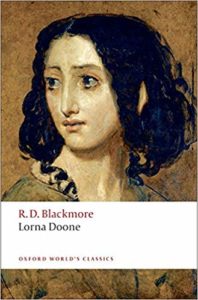 my overall favourite was ‘Lorna Doone’ narrated by Jonathan Keeble. What a fantastic narrator he is bringing this wonderfully funny, poignant and wise picaresque narrative to life. That many people dismiss this book as a mere romance is so unfair. You may as well say that ‘David Copperfield’ or ‘Great Expectation’ are romances. I adored Lorna Doone.
my overall favourite was ‘Lorna Doone’ narrated by Jonathan Keeble. What a fantastic narrator he is bringing this wonderfully funny, poignant and wise picaresque narrative to life. That many people dismiss this book as a mere romance is so unfair. You may as well say that ‘David Copperfield’ or ‘Great Expectation’ are romances. I adored Lorna Doone.
Most disappointing book: The House at Bishopsgate. Why did I persevere with this long and boring book by Kate Hickman? It sounded so good. Set in the 17th century, a married couple – he a merchant, she weak from a devastating experience – return to England from Constantinople to the eponymous house. Seeking help for his wife, the merchant allows another woman to insinuate herself into their lives. How could people with such interesting backgrounds be so tedious? Does the wife, Celia, have to be so pathetic? What on earth does the subplot around the merchant’s brother and their father’s crumbling estate have to do with anything? Who cares?
Best non-fiction book: I Am, I Am, I Am. This collection of autobiographical essays by novelist Maggie O’Farrell was a delight. Each essay read like a beautifully executed short story and combined they had the interconnectedness and thematic depth of a novel. Absolutely revelatory and wonderful.
 This story was someone’s suggestion for a perfect short story. It was published in the New Yorker in 2002. It begins with a translator, Walter Such, at home in his lounge room with a guest, Susanna, having a drink. His wife, Marit, comes downstairs in a red evening dress ‘in which she had always been seductive, with her loose breasts and sleek, dark hair’. She asks for a drink too. It transpires that Marit is sick and, as the group talks in a desultory way, ominously the narrators tell us, ‘It was the night they had decided would be the one’.
This story was someone’s suggestion for a perfect short story. It was published in the New Yorker in 2002. It begins with a translator, Walter Such, at home in his lounge room with a guest, Susanna, having a drink. His wife, Marit, comes downstairs in a red evening dress ‘in which she had always been seductive, with her loose breasts and sleek, dark hair’. She asks for a drink too. It transpires that Marit is sick and, as the group talks in a desultory way, ominously the narrators tell us, ‘It was the night they had decided would be the one’.






